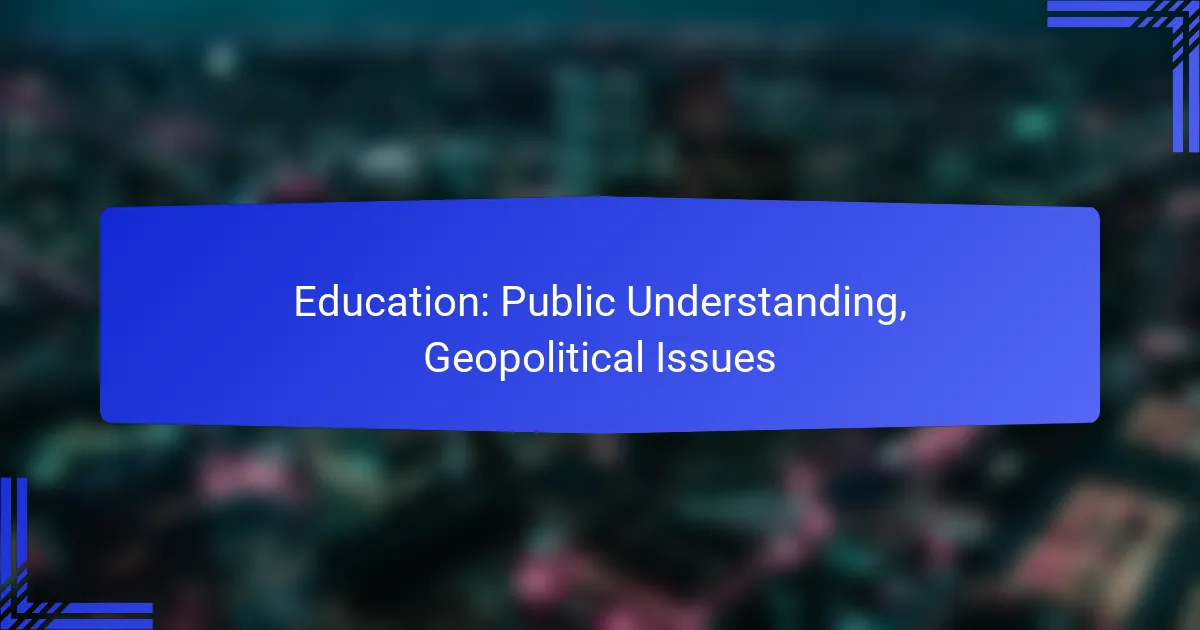Public understanding is essential in shaping geopolitical issues, as it influences how citizens perceive and react to global events. By fostering a well-informed populace through effective educational strategies, such as interactive workshops and online courses, we can enhance decision-making and policy formulation that impacts international relations.
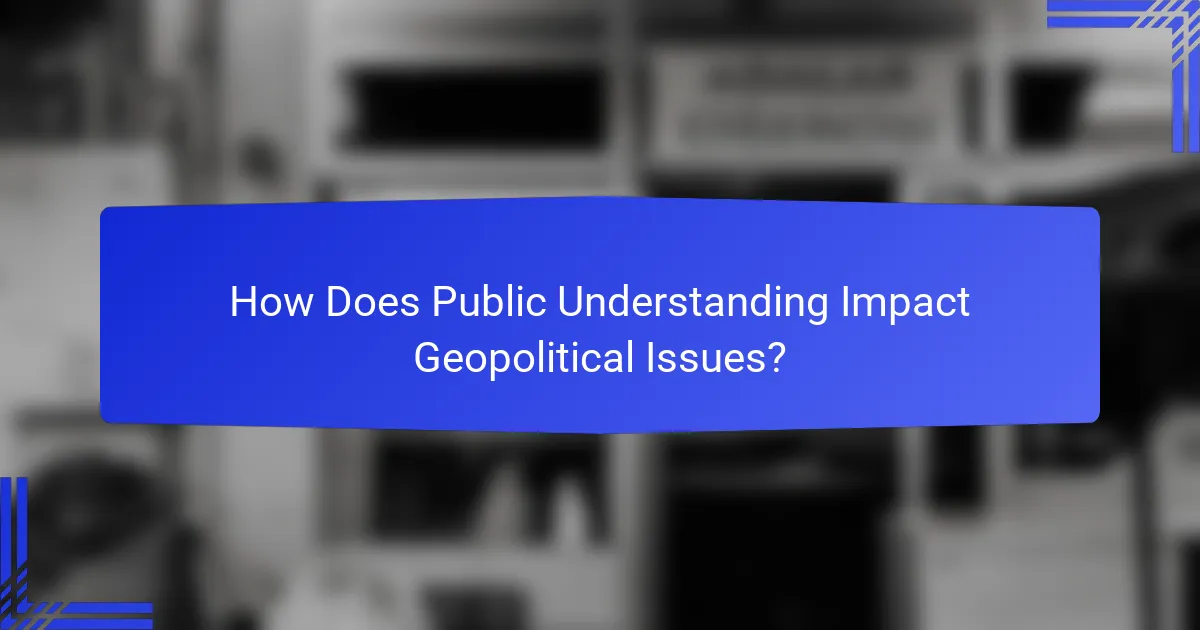
How Does Public Understanding Impact Geopolitical Issues?
Public understanding plays a crucial role in shaping geopolitical issues by influencing how citizens perceive and respond to global events. A well-informed populace can lead to more effective decision-making and policy formulation, ultimately affecting international relations.
Informed citizenry promotes better decision-making
An informed citizenry is essential for effective decision-making in democratic societies. When people understand geopolitical issues, they are better equipped to engage in discussions, advocate for policies, and hold their leaders accountable. This engagement can lead to more thoughtful and representative governance.
For example, citizens who grasp the complexities of trade agreements or military alliances are more likely to support or oppose policies based on informed reasoning rather than misinformation. This understanding can foster a more stable political environment and enhance national security.
Public opinion shapes government policies
Public opinion significantly influences government policies, especially in democratic nations. When citizens express their views on geopolitical matters, elected officials often respond to these sentiments to maintain their support. This responsiveness can lead to policy changes that reflect the public’s understanding and concerns.
For instance, widespread public opposition to military intervention can prompt governments to reconsider their strategies. Conversely, strong support for international cooperation may lead to increased funding for diplomacy and foreign aid initiatives.
Media influence on public perception
The media plays a pivotal role in shaping public perception of geopolitical issues. Through news coverage, social media, and opinion pieces, the media can highlight certain narratives while downplaying others, influencing how the public understands complex international dynamics.
For example, sensationalized reporting on conflicts can lead to heightened fear or misunderstanding, while balanced coverage can promote awareness and empathy. It is crucial for citizens to critically evaluate media sources and seek diverse perspectives to form a well-rounded understanding of global issues.
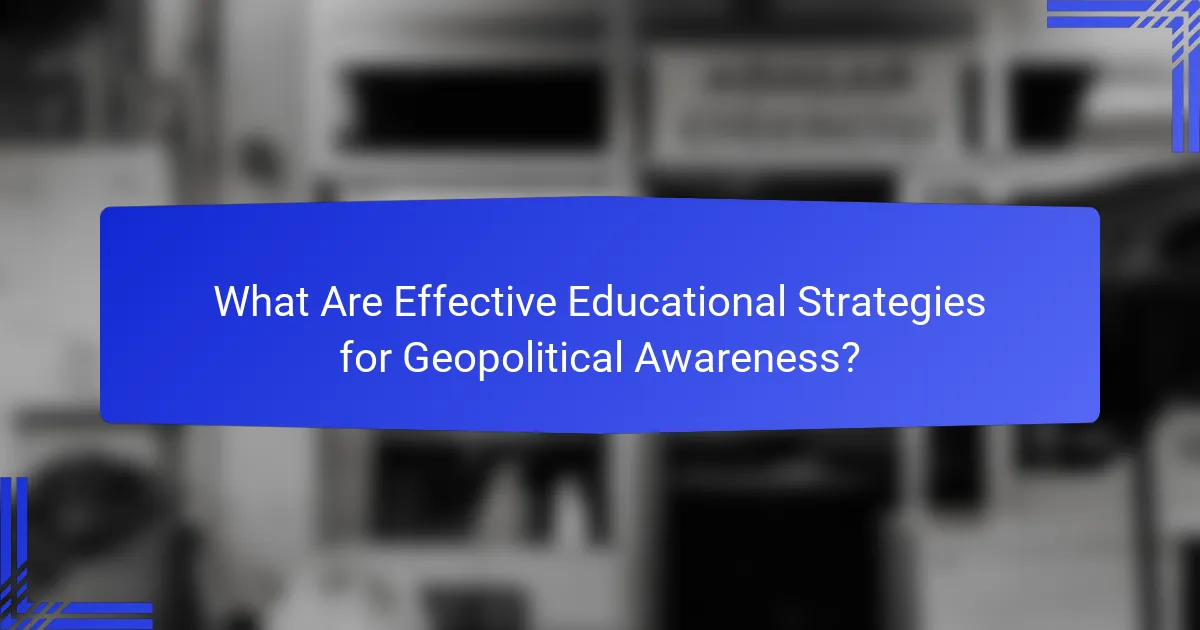
What Are Effective Educational Strategies for Geopolitical Awareness?
Effective educational strategies for geopolitical awareness include interactive workshops, online courses, and collaborations with educational institutions. These methods engage learners and provide them with the tools to understand complex global issues.
Interactive workshops and seminars
Interactive workshops and seminars facilitate hands-on learning experiences that encourage participants to engage with geopolitical topics actively. These sessions often include discussions, role-playing, and case studies that reflect real-world scenarios, allowing attendees to apply theoretical knowledge practically.
To maximize effectiveness, workshops should be tailored to the audience’s knowledge level and interests. For instance, a seminar for high school students might focus on current events, while one for university students could delve into historical contexts and policy implications.
Online courses on global issues
Online courses offer flexibility and accessibility for learners interested in global issues. Many platforms provide courses that cover a range of topics, from international relations to economic policies, often featuring expert instructors and interactive content.
When selecting online courses, consider those that include assessments and opportunities for discussion. This engagement can enhance understanding and retention of complex geopolitical concepts. Look for courses that are recognized by educational institutions or professional organizations for added credibility.
Collaborations with educational institutions
Collaborations with educational institutions can enrich geopolitical education by leveraging resources and expertise. Partnerships between schools, universities, and organizations can lead to joint programs, guest lectures, and exchange opportunities that broaden students’ perspectives.
These collaborations can also facilitate access to research and data, enhancing the learning experience. For example, a university might partner with a think tank to provide students with insights into current geopolitical trends and policy analysis, fostering a deeper understanding of the subject matter.
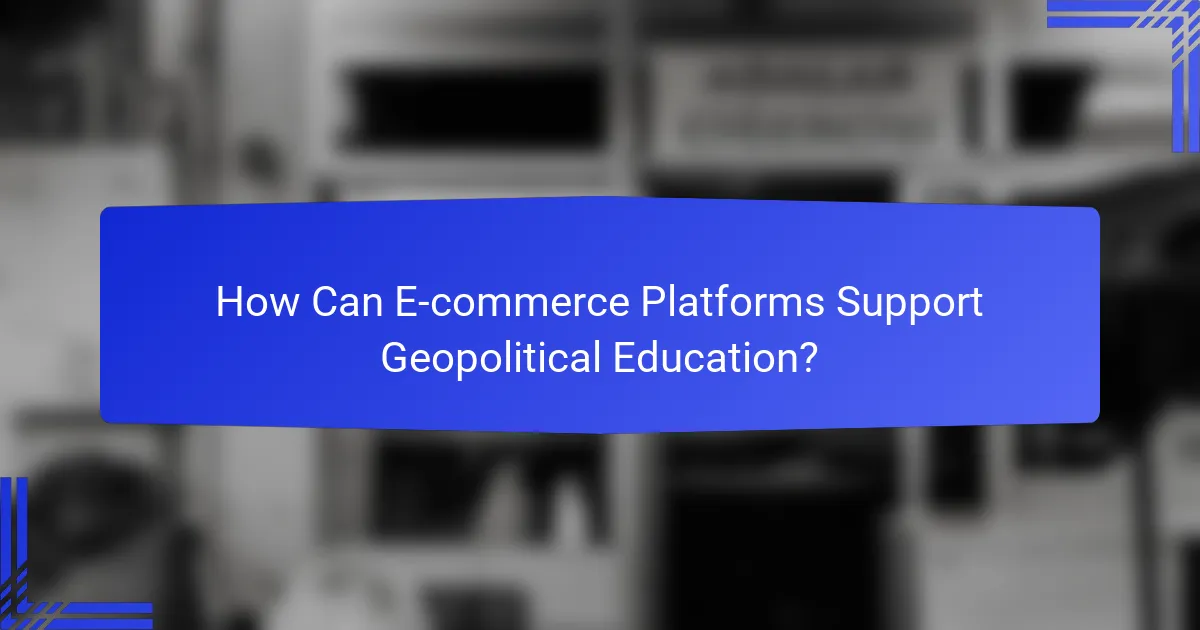
How Can E-commerce Platforms Support Geopolitical Education?
E-commerce platforms can play a vital role in enhancing geopolitical education by providing access to relevant resources, fostering partnerships, and facilitating community engagement. By leveraging their reach and technology, these platforms can help raise awareness and understanding of complex geopolitical issues.
Offering educational resources and materials
E-commerce platforms can curate and distribute educational materials such as articles, videos, and e-books focused on geopolitical topics. This can include resources from reputable sources that explain current events, historical contexts, and international relations.
For example, platforms could feature sections dedicated to geopolitical education, where users can find content organized by region or issue. Offering materials in multiple languages can also enhance accessibility for diverse audiences.
Partnering with NGOs for awareness campaigns
Collaborating with non-governmental organizations (NGOs) allows e-commerce platforms to amplify their impact on geopolitical education. These partnerships can facilitate awareness campaigns that inform users about pressing global issues, such as human rights, environmental challenges, and conflict resolution.
Platforms can host fundraising initiatives or promotional events that support NGOs, thereby educating their user base while contributing to meaningful causes. For instance, a portion of sales from specific products could be donated to NGOs focused on geopolitical education.
Creating community forums for discussion
Establishing community forums on e-commerce platforms encourages users to engage in discussions about geopolitical issues. These forums can serve as spaces for sharing perspectives, asking questions, and fostering dialogue among users from different backgrounds.
Moderated discussions can help maintain a respectful environment, while expert-led Q&A sessions can provide users with deeper insights. Encouraging user-generated content, such as articles or opinion pieces, can also enrich the educational experience and promote critical thinking.
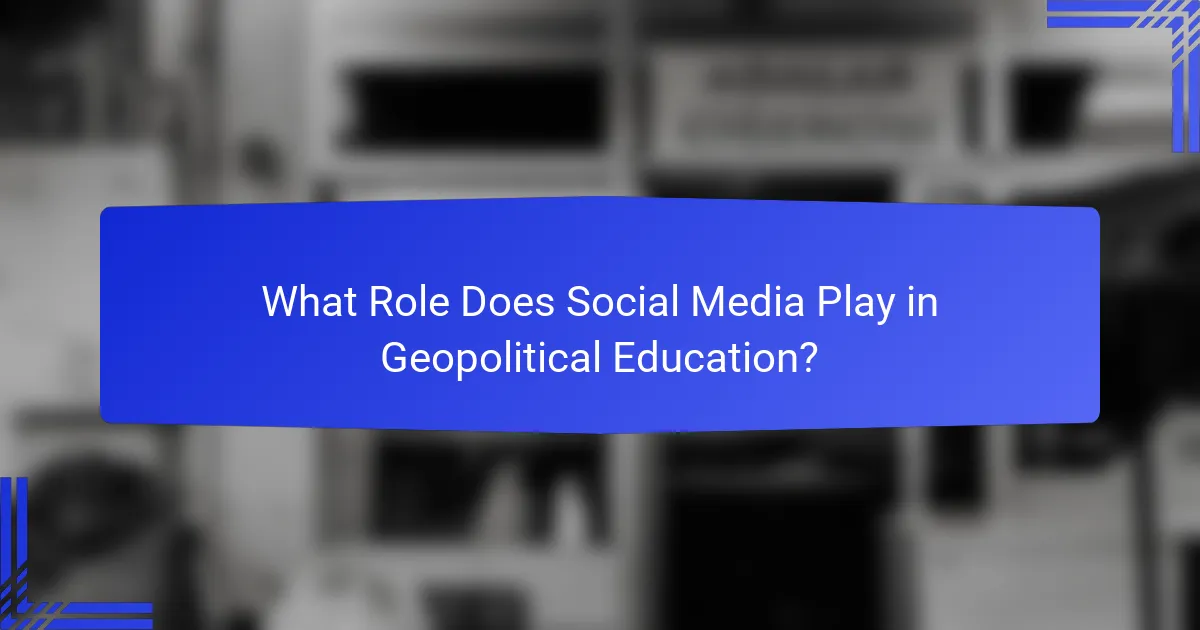
What Role Does Social Media Play in Geopolitical Education?
Social media significantly enhances geopolitical education by providing immediate access to information and facilitating discussions among diverse audiences. It serves as a platform where users can engage with global events, share perspectives, and learn from various sources in real-time.
Real-time information dissemination
Social media platforms allow for the rapid sharing of news and updates related to geopolitical events. Users can receive breaking news alerts and follow live updates, which can be crucial during crises or significant political developments.
This immediacy helps users stay informed about events as they unfold, often faster than traditional media outlets. However, it is essential to verify information from credible sources to avoid the spread of misinformation.
Engagement through discussions and debates
Social media fosters engagement by enabling users to participate in discussions and debates about geopolitical issues. Platforms like Twitter and Facebook allow individuals to express their opinions, ask questions, and challenge viewpoints, creating a dynamic exchange of ideas.
These discussions can enhance understanding and encourage critical thinking, but users should be cautious of echo chambers where only similar opinions are reinforced. Engaging with diverse perspectives can lead to a more comprehensive understanding of complex issues.
Influencer impact on public understanding
Influencers on social media can significantly shape public understanding of geopolitical matters. Many influencers use their platforms to educate their followers about international relations, conflicts, and policies, often simplifying complex topics for broader audiences.
While influencers can raise awareness and provide valuable insights, it is crucial for users to critically evaluate the information presented and consider the influencers’ backgrounds and potential biases. Following a range of credible sources can help balance perspectives and deepen understanding.
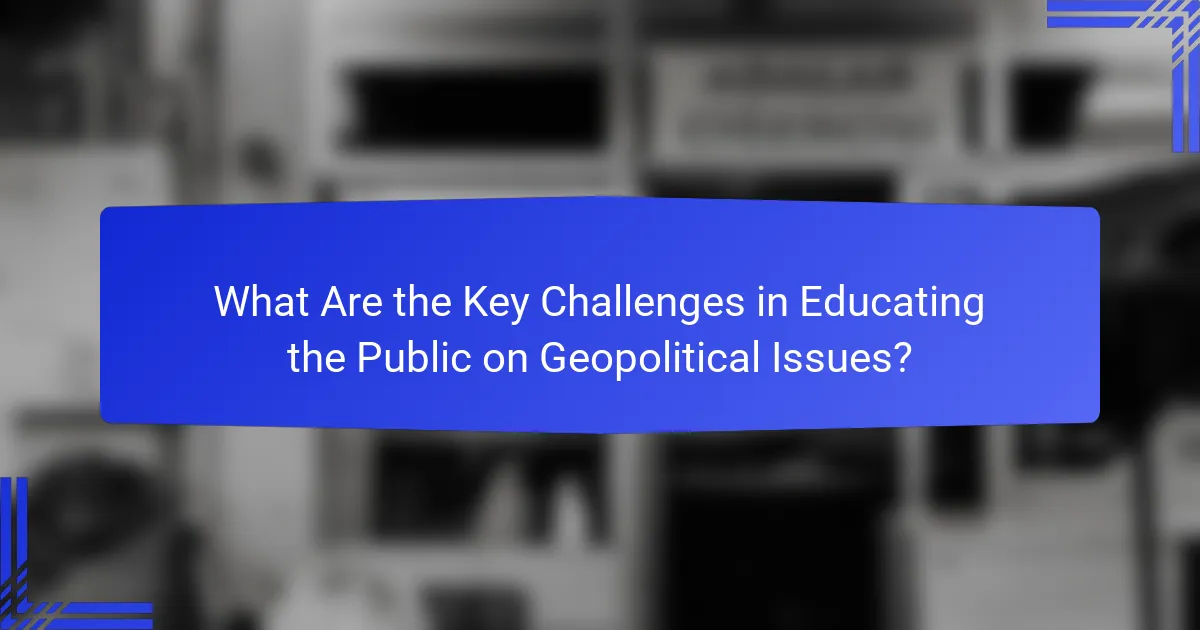
What Are the Key Challenges in Educating the Public on Geopolitical Issues?
Educating the public on geopolitical issues faces several significant challenges, including information overload, access disparities, and political biases. These factors can hinder effective understanding and engagement with complex global matters.
Information overload and misinformation
The sheer volume of information available today can overwhelm individuals trying to understand geopolitical issues. With countless news sources, social media platforms, and online articles, distinguishing credible information from misinformation becomes increasingly difficult.
To navigate this landscape, individuals should focus on reputable sources, such as established news organizations or academic publications. Developing critical thinking skills is essential for evaluating the reliability of information and recognizing bias.
Access disparities in education
Access to quality education on geopolitical issues varies significantly across different regions and demographics. In many areas, particularly in developing countries, educational resources may be limited, leaving individuals without the necessary tools to engage with global affairs.
Efforts to bridge this gap could include community education programs, online courses, and partnerships with local organizations to provide resources and training. Ensuring equitable access to information is crucial for fostering informed citizens.
Political biases affecting content
Political biases can heavily influence the way geopolitical issues are presented, leading to skewed perceptions among the public. Media outlets may cater to specific political ideologies, which can distort facts and shape public opinion in a particular direction.
To counteract this, consumers should seek diverse viewpoints and cross-reference information from multiple sources. Engaging with content that challenges personal beliefs can enhance understanding and promote a more balanced perspective on global issues.
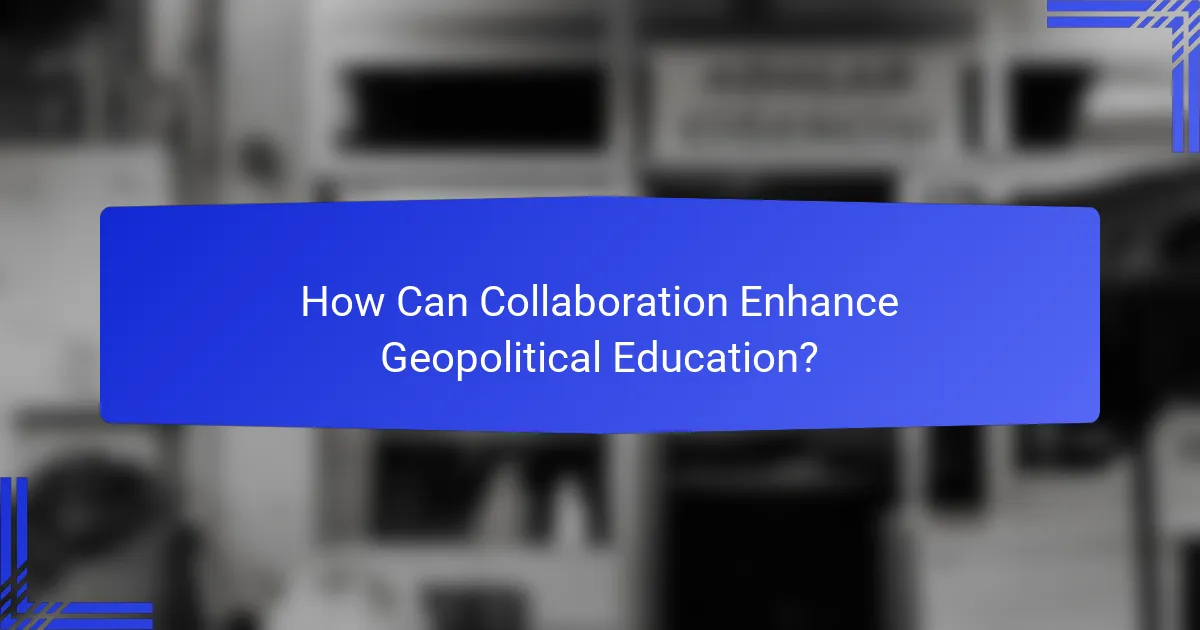
How Can Collaboration Enhance Geopolitical Education?
Collaboration can significantly enhance geopolitical education by fostering diverse perspectives and resources. By working together, educational institutions and organizations can create comprehensive programs that address complex global issues effectively.
Partnerships with international organizations
Forming partnerships with international organizations can provide access to a wealth of knowledge and resources. These collaborations often lead to the development of curricula that reflect global standards and best practices, ensuring that students receive a well-rounded education in geopolitical issues.
For instance, partnerships with entities like the United Nations or NATO can facilitate workshops, guest lectures, and exchange programs. Such initiatives not only enrich the educational experience but also promote cultural understanding and awareness of international relations.
When establishing these partnerships, consider aligning educational goals with the mission of the organization. This alignment can enhance the relevance and impact of the educational programs, making them more appealing to students and educators alike.
